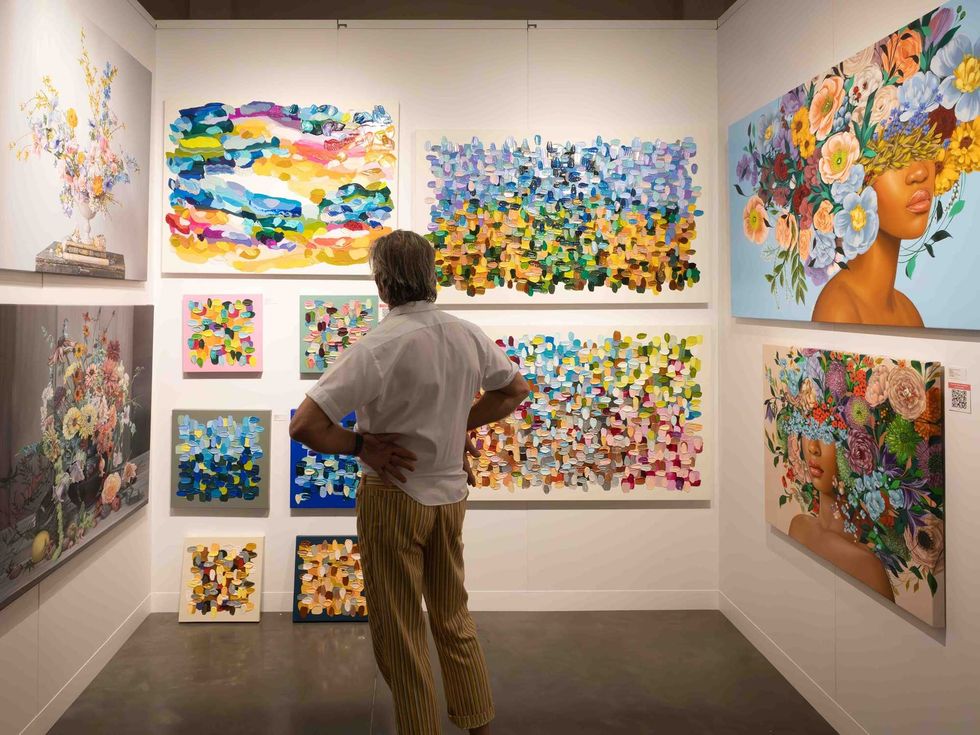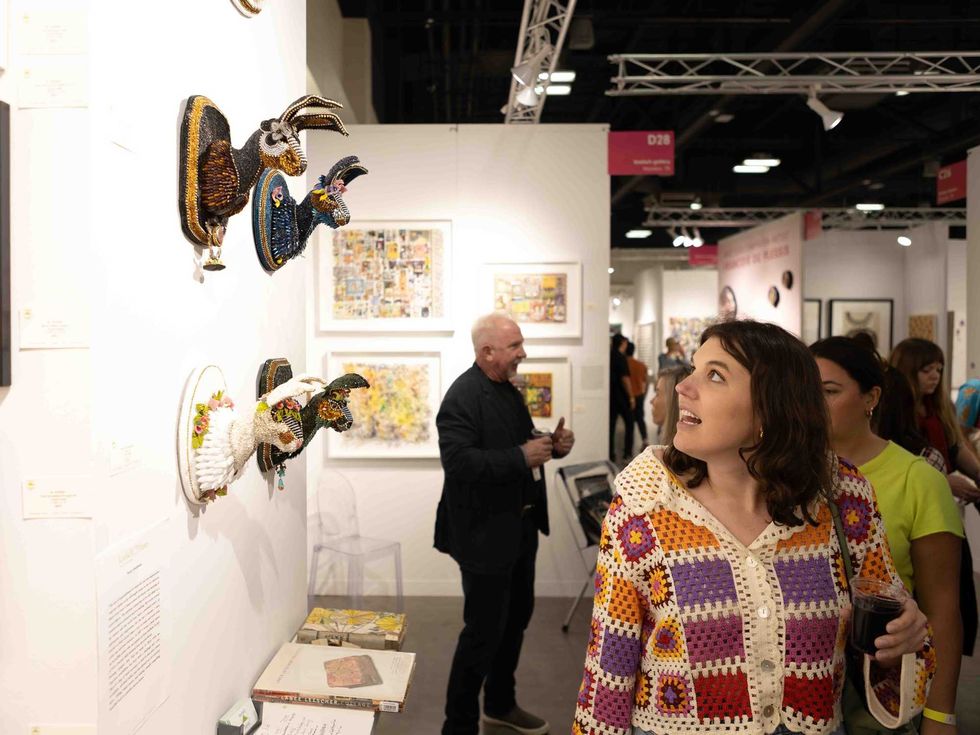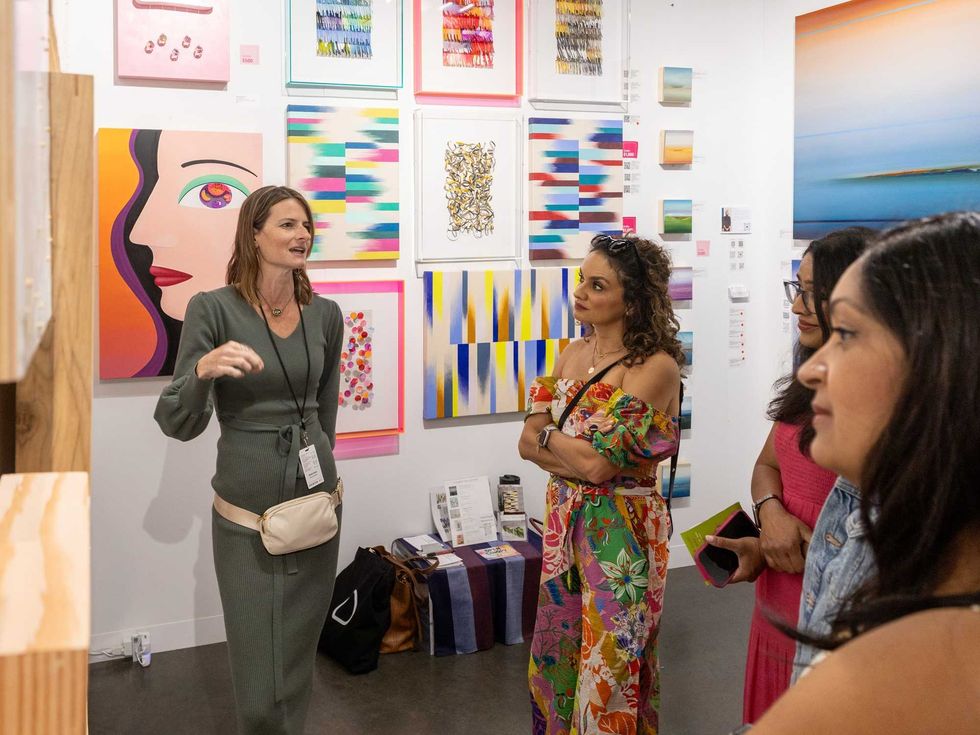Something Different
Seaweed soup fight! HGO's Korean opera is free, for everyday people andacademics, and very original
 Lee Gregory (Jensen) and Hana Park (Soo Yun) in From My Mother's MotherPhoto by © Feliz Sanchez/Houston Grand Opera
Lee Gregory (Jensen) and Hana Park (Soo Yun) in From My Mother's MotherPhoto by © Feliz Sanchez/Houston Grand Opera Performer Na Jung Jin plays the gayageum (a strung Korean zither) in From MyMother's MotherPhoto by © Feliz Sanchez/Houston Grand Opera
Performer Na Jung Jin plays the gayageum (a strung Korean zither) in From MyMother's MotherPhoto by © Feliz Sanchez/Houston Grand Opera Hana Park (Soo Yun) and Hyo Na Kim (Hal Mo Ni) in From My Mother's MotherPhoto by © Feliz Sanchez/Houston Grand Opera
Hana Park (Soo Yun) and Hyo Na Kim (Hal Mo Ni) in From My Mother's MotherPhoto by © Feliz Sanchez/Houston Grand Opera Performers Hyo Na Kim (Hal Mo Ni) and Mika Shigematsu (Om-Ma) in From MyMother's MotherPhoto by © Feliz Sanchez/Houston Grand Opera
Performers Hyo Na Kim (Hal Mo Ni) and Mika Shigematsu (Om-Ma) in From MyMother's MotherPhoto by © Feliz Sanchez/Houston Grand Opera Performers Hana Park (Soo Yun) and Mika Shigematsu (Om-Ma) in From My Mother'sMotherPhoto by © Feliz Sanchez/Houston Grand Opera
Performers Hana Park (Soo Yun) and Mika Shigematsu (Om-Ma) in From My Mother'sMotherPhoto by © Feliz Sanchez/Houston Grand Opera
While there are many operas about the sea, Jeeyoung Kim and Janine Joseph’s From My Mother’s Mother is likely the first opera centering on seaweed soup.
Part of Houston Grand Opera’s Song of Houston commissioning project, the new opera is intended, according to the company’s website, to “celebrate Houston as a meeting place for Eastern and Western cultures.” From My Mother’s Mother, the fifth opera in the unique series, focuses on the “passing down and rejection of tradition through four generations of Korean-American women.”
It premieres 1 p.m. Saturday at Discovery Green as part of the Korean Festival, with subsequent performances at the Museum of Fine Arts, Houston (Sunday at 2 p.m.) and the University of Houston (6 p.m. Nov. 7 and noon and 7 p.m Nov. 9). All From My Mother's Mother performances are free.
Kim has an aunt who lives in Houston, and a number of friends. She hopes they will be impressed with her first opera and has been composing with them in mind.
The project has been ongoing for several years. In April, HGO will offer the sixth premiere, composer Marty Regan and librettist Kenny Fries’ The Memory Stone, which focuses on themes of the devastation of the 9.0 magnitude earthquake and resulting massive tsunami that hit Japan.
If any composer is particularly suited to HGO’s intriguing initiative, it has to be Jeeyoung Kim, since her sophisticated training occurred both in the East and the United States. She studied with composer In-Young La at Yonsei University in Seoul before graduate studies at Indiana University, later obtaining a Doctor of Musical Arts from Yale, where she studied with composer Jacob Druckman, Ezra Laderman and Martin Bresnick.
While she has a wide range of work to her credit, this is her first attempt at opera. She finds the process overwhelming at times, but also thrilling.
“It is really exciting to work with various people, like a stage director and all the singers,” Kim says. “It’s very, very different from working with instruments only, because we have to bring a story to the audience, and the singers have to have some feeling about this story and their characters.
"The first day of rehearsal, we sat in a circle and talked about our own experiences of family, tradition, and our cultural background, trying to relate our own story to this story. That was a really different experience for me.”
In order for her opera to reach a wide audience, Kim says she needed to look at what was universal rather than particular.
“If you go to Niagara Falls,” she says, “you’re going to be wowed by its gigantic size, no matter where you are from.” But she also speculated on how a Beethoven symphony might sound to people in a small Korean country village.
“They will wonder, what kind of noise is this?” she says, laughing.
Her score includes traditional classical Korean instruments, such as a 12-string zither played with the fingers instead of mallets (a part that could be played on the Western harp in future productions), along with standard Western classical instruments. Some instruments, however, she feels are common to both cultures, but with different connotations.
“There is a Korean bell,” she says, “and this is a very symbolic sound in Korea. It is considered there to be the sound of heaven.”
Kim has an aunt who lives in Houston, and a number of friends. She hopes they will be impressed with her first opera and has been composing with them in mind.
“They don’t go to contemporary music concerts,” she says, “and they don’t have an academic background. But I want them to have emotion when they see the opera. And when my professors from Yale come to the opera, I want to impress them as well.”
Poetic Music
An opera is dependent on a good libretto, in this case written by Houston poet Janine Joseph. It’s her first attempt at a text to be sung in a theatrical setting, though she says that her poems are often filled with stories and characters who, “come out and talk to each other,” as she described her own work.
“In my own work, I develop a speaker and she speaks in a certain way. Here, I was trying to be more aware of opportunities for musical setting, mostly using rhyme and repetition."
Extensively trained in matters of rhythm, meter and rhyme, Joseph says the operas and musicals she saw and heard while she was growing up reminded her that music has always been important to her writing.
“In my own work, I develop a speaker and she speaks in a certain way. Here, I was trying to be more aware of opportunities for musical setting, mostly using rhyme and repetition," Joseph says. "I started paying more attention to the characters and how they would articulate certain sentences.
"When Jeeyoung got hold of it, she found a very different kind of music in it, because she is trained in a different way."
Aware of the possible cliches of the immigration story, Joseph said she and Kim were more interested in the struggle between mothers and daughters.
“I am a student in literature, and I am aware of those kinds of tropes, of immigration, of East and West, and I didn’t want to write the quintessential immigrant experience,” she says. “So I had to start thinking about what that soup represents. It’s not just about soup.
"The mother and daughter argue, about the soup, but there is a bigger problem. So, that’s how we use the soup. So I started building outwards from there, working from Jeeyoung’s personal experience as a jumping-off point.”
As rehearsals progressed, Joseph said she found the process invigorating, even if she couldn’t help imagining the singers mostly as the characters she had just created.
“I saw them come into the room, and I thought of what they had been doing in the libretto!” she says. “Yes, I would love to do something like this again, since it allows me to exercise a different part of my brain.
It’s collaborative, which is so refreshing, when usually I am in front of a computer, all day, alone in my room!”



